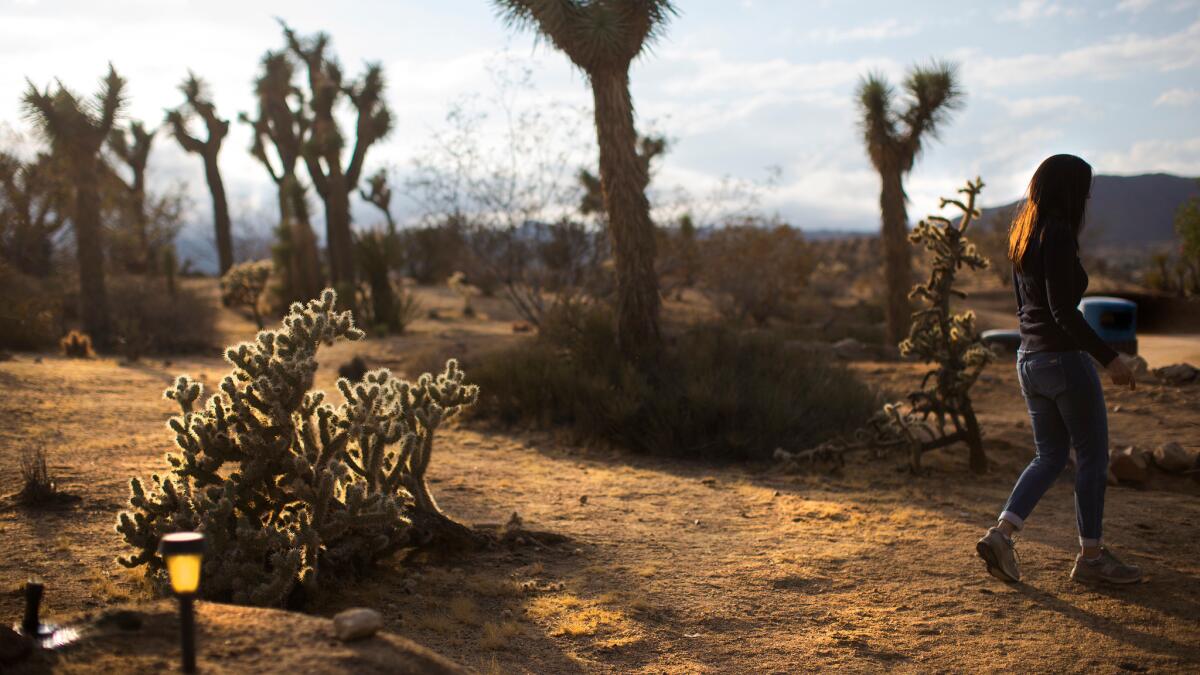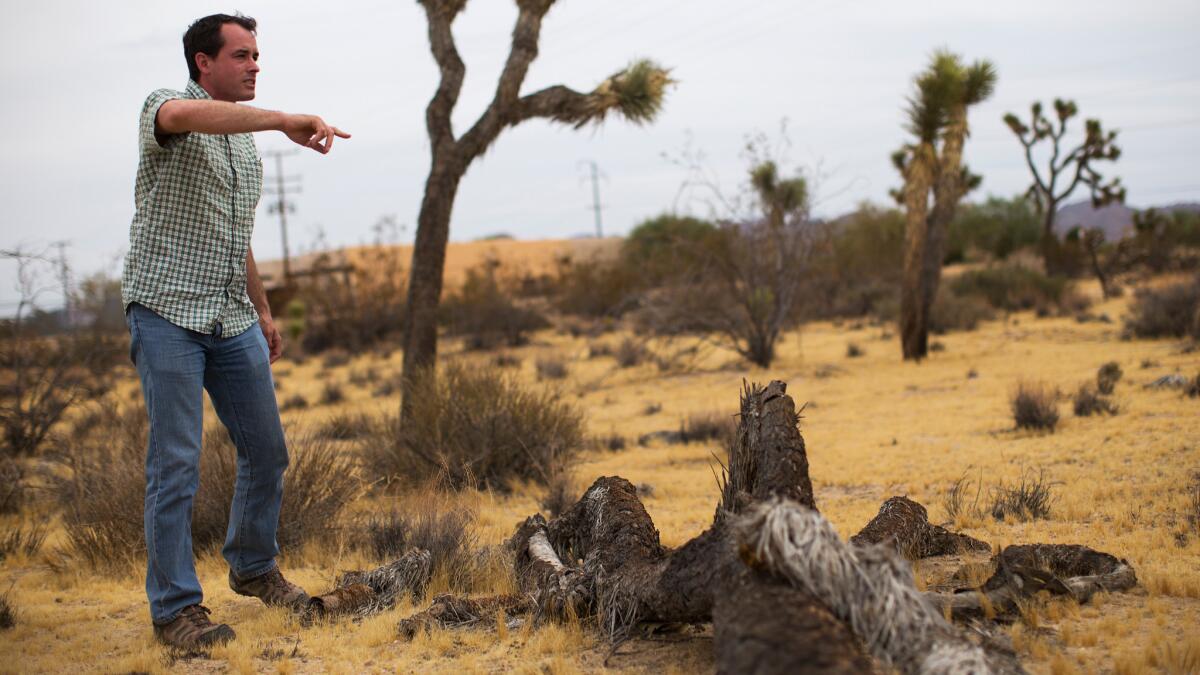The battle over a rock fest that Joshua Tree locals say will rattle wildlife and the desert town’s chill vibe

Reporting from JOSHUA TREE, Calif. — This high desert enclave has long been a refuge for nature lovers, artists, seekers and misfits of every stripe, drawn as if by a magnetic vortex to its otherworldly landscape of weather-sculpted rocks and forests of the spindly icon for which the reputedly chill town is named.
In recent months, though, Joshua Tree’s peace has been shattered as neighbors have been at each other’s throats over a local meditation retreat’s plan to jump on the desert music festival bandwagon — a decision its director this week said she would reverse, after the organization’s Desert Daze concert in October.
Nestled on a 400-acre spread along California 62, about 30 miles north of Palm Springs, the Institute of Mentalphysics has, since 1941, focused on teaching a combination of breathing techniques and spiritual awareness that its website calls “the science of the future” and a “Super Yoga.”
In March, however, the institute surprised the community by hosting its first rock festival.
The sound from that event, neighbors say, rattled windows and the lighting effects illuminated mountains miles away.
What fascinates me is the meanness of our critics. We’re not doing anything wrong, just holding a few musical events.
— Victoria GeVoian, executive officer of the Institute of Mentalphysics
This summer the institute cleared vegetation from a few acres to create parking for a Labor Day weekend music festival.
That event unfolded under a dome and featured the rapper Childish Gambino, who, in his other life as Donald Glover, created and stars in the television series “Atlanta.”
The institute’s next event, the Desert Daze festival, begins Oct. 14 and will feature 80 performances by an eclectic array of bands such as Primus, Fat White Family and Fartbarf.
“We love the bands they’re showcasing,” said Brendan Cummings, a Joshua Tree resident and senior counsel at the Center for Biological Diversity. “The problem is the location, and what they are doing to it.”
Cummings and other local residents say they regard the abrupt transformation of the quiet retreat into a rock music venue as an assault on their traditions and culture, and on a wildlife corridor that is home to rare plants and traversed by imperiled creatures, including desert tortoises and bighorn sheep.
We love the bands they’re showcasing. The problem is the location, and what they are doing to it.
— Brendan Cummings, senior counsel at the Center for Biological Diversity.
“The impacts are not only deeply disrespectful to the community,” Cummings said, “but highly disruptive to wildlife.”
Residents have been fighting back with complaints to San Bernardino County, state and federal agencies, and law enforcement authorities in the area. The county’s land use services department recently fined the institute for removing yuccas without a permit.
The controversy has led opponents of the concerts to scrutinize the tax-exempt church and nonprofit’s records. And some of its founder’s ideas raise eyebrows.
“It’s unfortunate this is happening,” said Victoria GeVoian, 63, executive officer of the Institute of Mentalphysics. “What fascinates me is the meanness of our critics. We’re not doing anything wrong, just holding a few musical events.”
GeVoian said the group is working to address concerns from neighbors, including making next month’s Desert Daze festival the last big rock music event they organize.
“If it’s going to cause such an uproar, we don’t need rock concerts,” she said as incense burned and water cascaded down desktop fountains in the institute’s gift shop. “After Desert Daze, we’re not going to do another one.”
The California desert’s unlikely status as a premiere music venue has been a long time coming and stems in part from the legend that followed the 1973 overdose death of Flying Burrito Brothers singer Gram Parsons in room 8 of the Joshua Tree Inn.
Pappy & Harriet’s Pioneertown Palace, a venue just outside the town of Joshua Tree, opened in 1982 and now features an annual Desert Stars festival. Just over a decade later, in 1993, Pearl Jam’s performance at the Empire Polo Club in Indio helped spawn the three-day Coachella Festival, which drew an estimated 99,000 people a day this year.
On the weekend of Desert Daze, the better known Desert Trip festival at the Indio site will feature the Rolling Stones, the Who, Paul McCartney, Neil Young and Bob Dylan, and has been nicknamed “Oldchella,” because so many of the acts feature performers in their 70s.
As many as 70,000 music fans a day are expected to attend that concert, while the institute’s festival has been permitted for only 2,000 ticket holders a day.
The institute was founded by Edwin John Dingle, an Englishman who also adopted the name Ding Le Mei, after walking across Tibet and China. It was on this spiritual journey that he gained the “secret wisdom” he used to establish what would become one of Southern California’s more enduring spiritual sects.
Frank Lloyd Wright and his son, Lloyd Wright, designed many of the institute’s gardens and buildings. Dingle, who died in Yucca Valley in 1972, conceived Mentalphysics to share breathing exercises and forms of yoga he discovered in Tibet, then modified them to help Westerners cope with the stress and strains of modern urbanity.
The preface of an edition of Dingle’s book, “My Life in Tibet,” says that Dingle believed Tibet was a depository of the “ancient wisdom of a superior Aryan race” dedicated to “keeping its white blood pure.” Published by the institute in 1979, the edition says this race’s descendants in Europe and America were “responsible for the great strides of modern science and technological civilization.”
“I had no idea it said such things,” GeVoian said of the edition, which was on sale in the institute’s bookstore. “I’m taking that book off the shelves tonight. It’s gone.”
As for the rock concerts, she said, “Our goal was to offer younger people an opportunity to experience a concert — but in a different kind of environment, one that allows them to connect with nature and exposes them to programs we offer such as meditation, breath work, yoga and personal development.”
A portion of the proceeds, she added, would fund an overhaul of the institute’s aging electrical and plumbing infrastructure, and add a few new coats of paint inside and out.
Frazier Haney, conservation director at Mojave Desert Land Trust, a nonprofit dedicated to acquiring and protecting undeveloped habitat, said GeVoian misses the point.

“Folks around here have a big problem with the institute’s seemingly hasty and irresponsible actions inside of an area that is ecologically intact,” he said. “Removing a few old yucca plants can disrupt the life cycles of countless desert creatures.”
Of particular concern are potentially adverse cumulative effects of successive rock music festivals on 80 acres of habitat in a wildlife corridor adjacent to the institute that the land trust has targeted for acquisition. “There are at least 1,000 Joshua trees on that land,” Haney said.
Last week, critics appeared to win a significant victory in their fight against the group’s rock concerts. As light rain fell on Tuesday afternoon, GeVoian said she wanted to iron out the differences with the community.
“If it’s going to cause such an uproar, we don’t need rock concerts,” she said as incense burned and water cascaded down desktop fountains in the institute’s gift shop. “After Desert Daze, we’re not going to do another one.”
Critics will be watching and listening.
“Let’s hope the future for this site is one of healing for the community and the land that has been damaged,” Cummings said, “rather than conflict.”
Twitter: @LouisSahagun
ALSO
Bullet train route across Big Tujunga Wash meets growing opposition
Soaring temperatures bring increased risk of wildfires to Southern California
More to Read
Sign up for Essential California
The most important California stories and recommendations in your inbox every morning.
You may occasionally receive promotional content from the Los Angeles Times.











